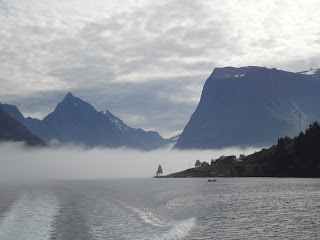We've traveled from India and Norway to land in the middle of small-town, dairy-farming, creemee-eating, swimming-hole-jumping, roadside-farm-stand, muggy New England summer Vermont. We've spent the last few days driving around, pointing out the window at adorable all-brick colonial farmhouses, and wondering what the bright green hills will look like in another month or two. We've found an apartment right in the center of town, so we can walk to all five local businesses and the college campus. Kacy has been settling in to her new office.
When I interviewed for a job at the local public radio station last week, they told me that, since the only restaurants nearby the station were fast food joints: "If you eat like a Vermonter, you'll have to bring your own lunch." What does a Vermonter eat like? "Oh, you know, local, seasonal, whole grain...stuff like that." I do believe we've come to the right place.
It's hard to synthesize how the last year of traveling has affected us in the long-term, or to imagine what kind of impact it is going to have on our future. I do know that we are both very thankful for all that we have learned, and for the kindness and generosity we have received along the way. We are also very glad to be back together again, building a home once more.
Though I never thought I would be a blogger, it has been an incredible experience for both of us to keep this record of our journeys. Thanks to all of you who have read these pages and sent comments and encouragement. If I get a chance, I'll post an update or two as I'm driving across the country, but for the most part, I believe this blog has reached the end of the road. Middlebury, Vermont.

















